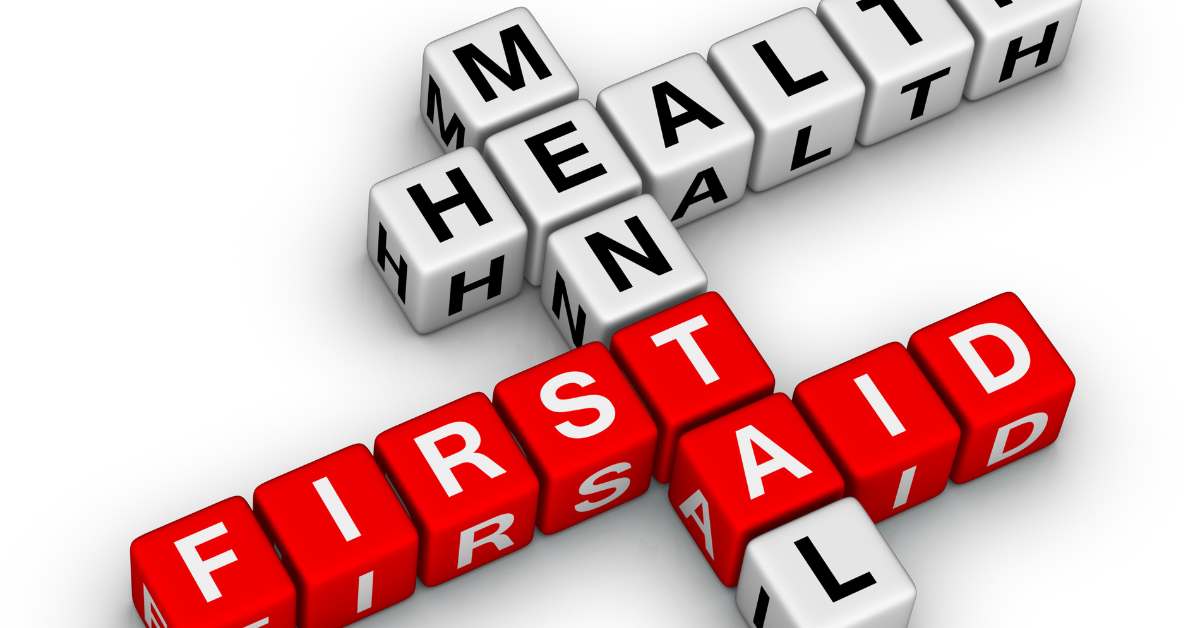What is mental health first aid?
Mental Health First Aid takes the fear and hesitancy out of opening conversations about mental health and substance use problems by boosting understanding and offering an action plan that educates individuals how to safely and responsibly identify and handle a suspected mental illness or substance use disorder.
Similar to traditional first aid, mental health first aid recognizes when someone needs assistance and provides prompt assistance to individuals in immediate need. Mental health first aiders (MHFAs) are entrusted with identifying the warning indications of mental health issues and offering specifically tailored and personalized help, as opposed to treating a physical illness.
Even though mental disorders and illnesses are not necessarily physical, their effects can still be just as severe and crippling as those of their physical counterparts.
In England, 1 in 4 people encounter mental health issues, with anxiety, depression, PTSD, phobias, panic disorder, and obsessive-compulsive disorder (OCD) being the most common. Issues with mental health are among the major contributors to the global disease load, according to experts. Particularly, depression is the second most common reason for disability in the world.
In order to properly protect the vulnerable, institutions can use mental health first aid to help those who require support and comfort, comprehend mental health issues, encourage good mental health and recovery, and stop conditions from getting worse.
Importance of mental health first aid
Mental Health First Aid takes the fear and hesitancy out of opening conversations about mental health and substance use problems by boosting understanding and offering an action plan that educates individuals how to safely and responsibly identify and handle a suspected mental illness or substance use disorder.
More people can receive the assistance they require when they have the tools necessary to initiate a conversation. Mental Health First Aiders play a crucial role in connecting people who are struggling with their mental health or substance use to the right resources. The following factors emphasize the significance of online mental health first aid courses.
- Mental health problems are common. The prevalence of mental problems in children and teenagers is likewise believed to be around 20% of the population of that age range in any given year.
- There is stigma associated with mental health problems. Negative attitudes and actions toward mental health diseases and treatments might lead to those affected attempting to conceal their difficulties and avoiding necessary care.
- Many are not well informed. Some individuals may not know how to recognize mental health problems, how to respond, or what effective treatments are available.
- Few know how to respond. Participants learn a five-step action plan for supporting someone suffering from a mental illness or experiencing the signs and symptoms of an emotional crisis.
Basic steps of MHFA
There are five steps in the MHFA Action Plan, and they can be used in any sequence.
- A – Approach and evaluate the potential for injury or suicide. A good place or time to start the talk with the person is one that respects their privacy and confidentiality. Encourage them to talk to someone they trust if they don’t want to confide in you.
- L – Listen without bias. Many people who are struggling or in distress want to be heard first, so give them space to speak without interjecting. Try to feel sympathy for their predicament. You can start the conversation by saying, “I noticed that,” for example. Even if you disagree with what they are saying, try to be accepting.
- G: Provide information and assurance. Be prepared to offer encouragement and helpful information once someone has shared their experiences and feelings with you.
- E – Promote seeking the proper expert assistance. One’s chances of recovering are better the earlier they seek assistance. Therefore, it’s crucial to offer to assist this person in learning more about their options.
- E – Promote self-help and other forms of support. This involves making a customized plan for their emotional and physical well-being, as well as assisting them in identifying their support system and community resources.
Best course for mental health first aid training
A mental health issue will affect 1 in 5 individual each year. Therefore, whether it be a friend, family member, or coworker, everyone is likely to know someone who is dealing with a mental health issue. In fact, it is widely believed that everyone is affected by mental disease, either directly or indirectly. This shows the need for community care models that empower people where they live, work, and play and makes mental health everyone’s business. This is where Mental Health First Aid training courses can help.
Nursing Revalidation provides best Mental Health First Aid course. This course will teach participants how to notice and support individuals who may be experiencing mental health issues or exhibiting the signs of substance use in a work environment. They are also taught how to connect those people with appropriate help from fellow employees, community resources or healthcare professionals.
The bottom line
Mental health first aid is a tool to nurture healthier minds, foster more supportive workplaces and ultimately strengthen communities. It’s mandatory to learn mental health in order to care for our loved ones.

